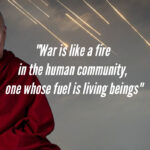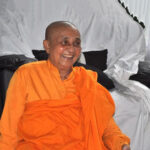Institutionalized racism against the Rohingya Muslims led Burma to genocide

For those outside Burma, the broadcast images of the Theravada monks of the ?Saffron Revolution? of 2007 are still fresh. Backed by the devout Buddhist population, these monks were seen chanting metta and theLovingkindness Sutta on the streets of Rangoon, Mandalay, and Pakhoke-ku, calling for an improvement in public well-being in the face of the growing economic hardships afflicting Burma?s Buddhists. The barefooted monks? brave protests against the rule of the country?s junta represented a fine example of engaged Buddhism, a version of Buddhist activism that resonates with the age-old Orientalist, decontextualized view of what Buddhists are like: lovable, smiley, hospitable people who lead their lives mindfully and have much to offer the non-Buddhist world in the ways of fostering peace.
But in the past year, the world has been confronted with images of the same robed monks publicly demonstrating against Islamic nations? distribution of aid to starving Muslim Rohingya, displaced into refugee camps in their own country following Rakhine Buddhist attacks. The rise of genocidal Buddhist racism against the Rohingya, a minority community of nearly one million people in the western Burmese province of Rakhine (also known as Arakan), is an international humanitarian crisis. The military-ruled state has been relentless in its attempts to erase Rohingya ethnic identity, which was officially recognized as a distinct ethnic group in 1954 by the democratic government of Prime Minister U Nu. Indeed, in the past months of violent conflict, beginning in June 2012, the Rohingya have suffered over 90 percent of the total death toll and property destruction, including the devastation of entire villages and city neighborhoods. Following the initial eruption of violence in western Burma, several waves of killing, arson, and rampage have been directed at the Rohingya, backed by Burma?s security forces.
Over the course of the past few years an extremely potent and dangerous strain of racism has emerged among Burma?s Theravada Buddhists, who have participated in the destruction and expulsion of the entire population of Rohingya Muslims. The atrocities occurring in the name of Buddhist nationalism in Burma are impossible to reconcile with the ideal of metta. Buddhist Rakhine throw young Rohingya children into the flames of their own homes before the eyes of family members. On June 3, 10 out-of-province Muslim pilgrims were pulled off a bus in the Rakhine town of Taunggoke, about 200 miles west of the former capital, Rangoon, and beaten to death by a mob of more than 100 Buddhist men. The crime occurred in broad daylight and in full view of both the public and local law enforcement officials.
One of the most shocking aspects of anti-Rohingya racism is that the overwhelming majority of Burmese, especially in the heartland of upper Burma, have never met a single Rohingya in person, as most Rohingya live in the Rakhine State of western Burma adjacent to Bangladesh.





